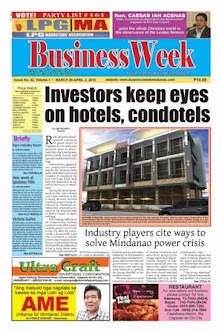A sense of economics, a matter of prosperity values
 BUSINESSMAN Niño Castrence was saddened and sounds exasperated by the snail paced and negative reception from the cause oriented groups and self righteous environmentalist against the Alsons Bio-ethanol Feedmill project in Mambuaya, a distant Barangay Southwest of Cagayan de Oro City. For years the BOI registered proponents were subjected to political pressure and disinformation by pseudo farmers who are stalling the project making the cost of putting up business more expensive.
BUSINESSMAN Niño Castrence was saddened and sounds exasperated by the snail paced and negative reception from the cause oriented groups and self righteous environmentalist against the Alsons Bio-ethanol Feedmill project in Mambuaya, a distant Barangay Southwest of Cagayan de Oro City. For years the BOI registered proponents were subjected to political pressure and disinformation by pseudo farmers who are stalling the project making the cost of putting up business more expensive.
The issues of environmental concern, water usage and disposal of industrial waste as well as depletion of agricultural land are nagging questions haunting the project.
Niño Castrence, a self made construction businessman, an avid Golfer and an award winning Photographer argued “that there will be no water depletion or pollution from the bio-mass processing plant. There are technology available and in use as well as government legislation in place to protect the sources of water and safeguard the disposal of industrial waste with strict compliance standards”.
Cagayan de Oro which has an inventory of 19,590 hectares of arable agricultural land with only 6,906 hectares develop to planting and production of crops will not suffer depletion of food resources. His project will only need 2,000 hectares or less to make the feedmill plant economically viable.
In Brazil, bio-ethanol plants exist side by side with coffee plantation, land pasture and other economic activities related to tourism. They have a bigger per capita income compares to the Philippines. Brazil has a robust economy that can afford to host Olympic Games. Their dependence to crude oil to power their transport and industries is absorbed by their Bio-ethanol industry.
The public must be informed further that worldwide, bio-ethanol industry is the most recession resilient in the hard hit economies. The technology is a driver of innovation, jobs generation and tax revenues for the local government aside from the bigger gross sales receipt which is collected by the countries tax revenue bureaus and goes to the national treasury. Based on World Bank survey, “the employment in this sector is steady and positioned for future growth”.
Most Asian industries and transport sectors are fossil fuel dependent that requires 90% importation of crude oil. Every Government are exerting scientific and legislative agenda to cut down on crude oil and look for renewable sources of energy.
Here is an investor committed to bank roll and has the financial resources to build a Cassava Plantation and feedmill facilities for bio-ethanol fuel that could create jobs and other economic activities subjected to a thread of a needle no one can believe.
Mr. Castrence, challenged the cause oriented groups, the media and the environmental advocates to see the flight of many Mambuaya residents lining up for the early morning jeepney rides to catch up with their work and menial livelihood undertaking in the public markets of Cagayan de Oro either as Handyman or Laborers in the Port of Macabalan to earn their daily bread. The picture shows lack of employment opportunities in the far flung Barangay that must be addressed by our leaders and the Government.
In February 2, 2010, the Department of Energy thru a press briefing by Secretary Angelo Reyes, mentioned that there were “223 Million Liters of Ethanol production in 2009 that went to Bio-diesel fuel” variety of feedstocks from Cassava wheat and sugar beet were processed as ethanol products.
In Cagayan de Oro, the Bureau of Customs as reference recorded an estimated P15.5 Billion of import values compared to P13.4 Billion of export values. Meaning Cagayan de Oro has a trade imbalance of P2.06 Billion represented by importation of machineries, farm chemicals and fuel used to energize the manufacturing and the transport sector.
In Northern Mindanao where land is fertile and not fully utilized. An investment similar to Alsons Project must be encouraged as a value of prosperity to create a birth place of bio-technology. Depletion of arable land allocated for food production is a misinformation spread by groups who are not even into farming and who do not own land in the disputed feedmill site.
























0 comments:
Post a Comment